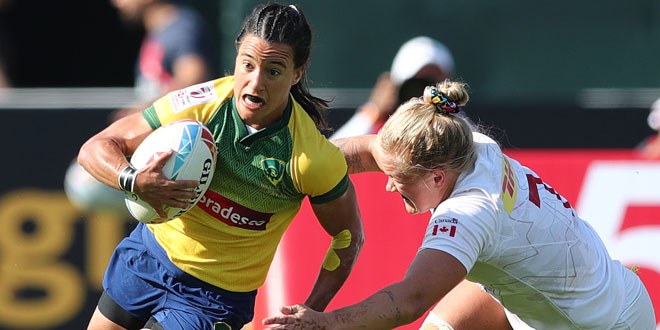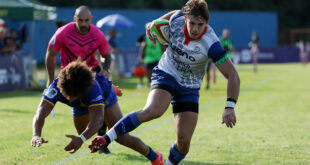Isadora Cerullo is the first international Olympian to join Premier Rugby Sevens. The Premier Rugby Sevens is a new USA-based Rugby Sevens league. It will be launched on October 09 in Memphis, Tennessee. It will be live via FS2 from 4pm-6pm Eastern.
The Brazilian 2016 and 2021 Olympian is the fifth Women’s and 12th overall Olympian to join Premier Rugby Sevens. Cerullo follows USA Women’s players Abby Gustaitis, Alev Kelter, Kristi Kirshe, Naya Tapper; and USA Men’s players Perry Baker, Danny Barrett, Martin Iosefo, Carlin Isles, Folau Niua, Stephan Tomasin, and Kevon Williams.
In total Premier Rugby Sevens will consist of 120 players in a league of 10 teams. They are to come in the form of six Men’s and four Women’s teams.
How were you recruited for PR7s?
I first got an email from Kellie Cavalier who put me in touch with Mike Tolkin, the former USA Eagles coach and current general manager for Premier Rugby Sevens, about the new league.
What excites you most about playing PR7s?
What excites me most is having an opportunity to play alongside some amazing international players who have been my adversaries over the years. It will be great to get out of the Brazilian bubble to play with and against these players. Plus the opportunity of working with different coaches.
How significant is the opportunity for Women rugby players domestically?
For players in the U.S. it is going to be a sanctioned tournament. So, it is officially at the highest level. Having this opportunity will test all the players and we know a lot of people will be watching. It is also exciting as it is a first taste of professional Sevens Rugby. It is more opportunities and, not to mention, it is so exciting that there will be equal contracts for both men and women.
What about Women internationally?
I guess it’s firstly an honor, as I will be the first Brazilian player contracted to Sevens outside of Brazil. So, that is huge for Brazilian rugby and this hopefully more Brazilian players will be able to get more contracts abroad. It will be huge for the game here. Overtime it will help elevate the level of rugby in Brazil.
How long have you been playing rugby?
I started playing at 19 at Columbia University. I had played soccer my whole life and had never heard of rugby. A friend of mine was going to play a match and asked me to go along. The captain of the Women’s team came up to me in the stands and encouraged me to try rugby. I only discovered that Brazil had a national team after I had graduated.
How did you go from there to now being an Olympian and professional athlete?
It has been a roller-coaster. I was planning on going to medical school and, all of a sudden, one of my coaches forwarded me an open invitation for athletes for the Brazilian team. In Columbia I had fallen in love with rugby, but it had always been something alongside my academic or professional ambitions. I stopped and told myself: you know what I am Brazilian, and the Olympics are in three years. My parents had left Brazil during the military dictatorship, so maybe they did not understand my decision to go back to Brazil, but they came around to supporting my aspirations. I firmly believe in respect and rugby values and, over these years, I’ve found my voice through sport to try to help make some change in Brazil. Some people forget that the USA is many steps ahead in some conversations.
How different is the profile of the Women’s game now compared to in 2013?
The Women’s game has grown immensely in the past few years. I went from playing Sevens as a summer sport to playing it as an Olympic sport. Now it is full-time with funding. In Brazil, sustainably the Women’s game only exists in Sevens. However, hopefully, this can continue to grow to include XV’s in the Women’s program.
How do Women’s 7s and XV’s compare in South America?
I think Sevens has a stronger tradition for the Women’s game in the region. There is annual competition and there is a focus which includes funding the Women’s game of Sevens. However, to grow the game, World Rugby know that they need to focus on Women’s XV’s. It is becoming obvious. The cool example is Colombia who are into repechage of the Women’s Rugby World Cup qualifiers. This gives us in Brazil so much motivation to grow XV’s nationally and to play against them; the current top Women’s XV’s team in the region. In the same way, Colombia and Argentina always pressure us to step up our game in 7s, and we use these healthy rivalries to elevate the level of rugby in the region, while representing South America on the World Series.
Is rugby now a viable profession for Women’s players?
It depends. I don’t yet know if it is a sustainable career for Women’s players. Contracts are quite temporary and there are not many sustainably paid opportunities to play. It is exciting to see the push to more professional contracts. It is one way forward to attract Women’s players to have a career in more than a short-term setting.
Isadora Cerullo has dual citizenship. She has lived in both the USA and Brazil. She was raised in North Carolina. In 2014 she moved to São Paulo for rugby purposes. She went on to win Bronze at the 2015 Pan Am Games, Gold at the 2018 South American Games and also competed at the Rio de Janeiro Olympics and Tokyo Olympics. She has two national Brazilian titles with Niterói and numerous South American titles. She is an ambassador for Athlete Ally and the Gay Games.
 Americas Rugby News Rugby news from across the Americas!
Americas Rugby News Rugby news from across the Americas!




